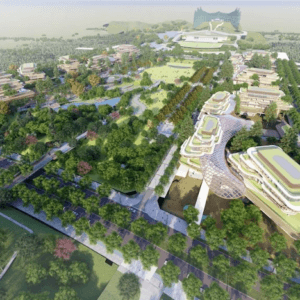Indonesia has set an increased climate target of reducing its carbon emissions by 32% below the business-as-usual scenario (BAU) by utilizing its resources and by 43% below BAU with international financial support. The country hopes to reach net zero emissions by 2060 but has not communicated it explicitly in its long-term strategy. The emission reductions...
Category: Indonesia News Brief and Action Alert
Indonesia spent 77.5 Trillion IDR in fossil fuel subsidies in 2022
According to Statista Research Department, in 2022, the Indonesian government invested approximately 77.5 trillion IDR in fossil fuel subsidies. This investment is less than the 2020 COVID-19 recovery budget, which heavily supported the fossil fuel sector and provided 95.3 trillion IDR directly to state-owned enterprises. The total fossil fuel bill in 2020 was 206 trillion...
Lack of Finance and Increased Frequency of Environmental Events Limits the Ability of Indigenous Peoples to Combat Climate Change in Indonesia
According to the International Work Group of Indigenous Affairs (IWGIA), Indonesia has a population of 70 million indigenous people, which accounts for 18% of the total population. Although it has a wide variety of ethnic communities; around half of the population belongs to the Javanese and Sundanese groups from Java Island. Various other ethnic groups...
Indonesia’s Agriculture Sector Contributed 2.4% of Global Agricultural Emissions in 2021
Indonesia’s agricultural sector is made up of large private and state-owned plantations and smallholder production modes. The large plantations of palm oil and rubber are exported, while the smallholder farmers produce rice, soybeans, corn, fruits, and vegetables. As cited by the Ministry of Agriculture, Central, East, and West Java are three of the largest rice-producing...
Indonesia: A Climate Look Past and Forward
Looking Back 2022: Floods, Droughts, and Other Extreme Weather Events Looking Forward 2023: To Make Substantial Progress in Eliminating DeforestationBackground information and weather events in 2022 Indonesia has been experiencing changes in rainfall patterns over the last several years. From July to September 2022, rainfall higher than the thirty-year-long...
Indonesia Seeks to Raise the Market Share of Electric Vehicles to 25% of Total Vehicle Sales by 2030
In May 2022, Indonesia’s new vehicle market declined “by almost 10% to 49,453 units compared to 54,815 units in 2021” as per the Just Auto report from June 15, 2022. A report from 14th June 2022 by Lowy Institute indicates that “In 2021, the ASEAN Automotive Federation reported more than 659,000 passenger vehicle sales in...
Climate Justice in Indonesia
HIGHLIGHTS Women and children are among the highest risk groups Extreme weather and water scarcity impact poverty rates, nutritional status, loss of forest and biodiversity NARRATIVE The Intergovernmental Panel on Climate Change (IPCC) continues to show that as the impacts of climate change accelerate, extreme weather events are taking a major toll in developing countries....
Nuclear Power Is Not A Primary Focus in Indonesia
This Post was submitted by Climate Scorecard Indonesia Country Manager Ruby OrimCurrently, none of Indonesia’s power is generated through nuclear energy as the country does not have any nuclear power plants. Nuclear power expansion is not a primary focus in Indonesia as the country’s geography grants access to many other forms of renewable energy. Indonesia’s...
Indonesia’s 2030 Climate Goals Are Insufficient
This Post was submitted by Climate Scorecard Indonesia Country Manager Ruby Orim Indonesia’s 2030 Climate Goals Are Insufficient According to the International Energy Agency (IEA), Indonesia’s total CO2 emissions in the most recent year, 2018, was 542.88 Mt of CO2. This is over a 313% increase from their total CO2 emissions in 1990. Indonesia’s...
Indonesia Spotlight: Jakarta Urban Regeneration Program
This Post was submitted by Climate Scorecard Indonesia Country Manager Ruby OrimThe Jakarta Urban Regeneration Program is a plan initiated by Jakarta’s governor, Anies Baswedan, in 2019. The plan was built to address Jakarta’s sinking problems and popular environmental malpractices. The Urban Regeneration Plan consists of goals to restructure Jakarta’s pipe water infrastructure to make...











